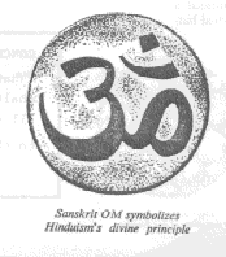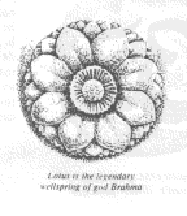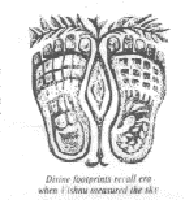CONVERSATION #1
CONCLUS ION:
"The Self never has his work exhausted . From this very Self he projects whatever he wants." .
THE UNIVERSAL SELF
In the beginning this universe was Self alone, in the shape of a person. He, looking round, saw nothing but his Self. He first said, "This is 1"; therefore he became I by name. Therefore to this day, if a man is asked, he first says, "This is 1," and then says the other name which he may have. And because before all this, he, the Self, burnt down all evils, therefore he was a person. Verily he who knows this, burns down everyone who tries to be before him.
He feared, and therefore any one who is lonely fears. He thought, "As there is nothing but myself, why should I fear?" Thence his fear passed away, for what was there to fear? Truly fear arises from a second one only.
But he felt no delight. Therefore a man who is lonely feels no delight. He wished for a second. He became as big as a man and wife embracing each other. l~e then made this his Self to fall in two, and thence came husband and wife. "We two are thus, each of us, like one of the t·o halves of a split pea." Therefore the void which was there is filled by the wife. He embraced her, and men were born.
She thought, "How can he embrace me, after having produced me from himself? I shall hide myself."
She then became a cow, the other became a bull and embraced her, and hence cows were born. The one became a mare, the other a stallion; the one a sheass, the other a heass and embraced her, and hence onehoofed animals were born. The one became a shegoat, the other a hegoat; the one became a ewe, the other a ram and embraced her, and hence goats and sheep were born. And thus he created everything that exists in pairs, down to the ants. He knew, "I indeed am the creation, for I created all this." Hence he was called the Creation....
One should meditate upon the Self alone as dear.... They say: Men think, "Through the knowledge of Brahman we shall become infinite." Well, what did Brahman know by which It became all? This Self was indeed Brahman in the beginning.

Therefore It became all.... One should
meditate only upon the world of the Self. He who meditates only upon . . . the Self never has his work exhausted. From this very Self he projects whatever he wants.... In the beginning this was Self alone, one only. He desired, "Let there be a wife for me that I may have offspring, and let there be wealth so that I may offer sacrifices." Truly this is the whole desire, and, even if one wishes, one cannot get more than this.
BRIHADARANYAKA UPAN;SHAD
ADHYAYA I, BRAHMANA IV

